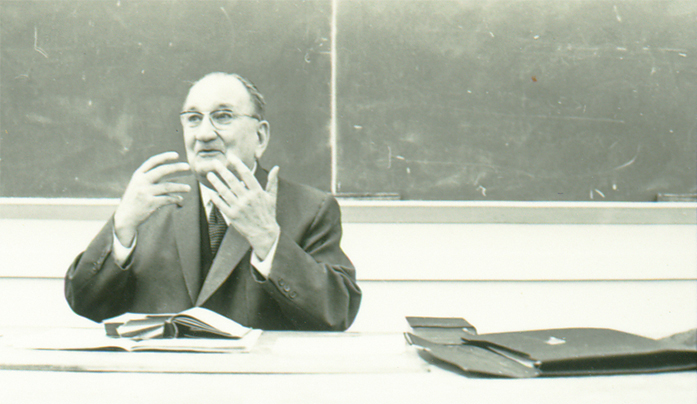Etienne Gilson’s The Unity of Philosophical Experience was recommended to me by Fr Rickert (whom regular readers will recognize) and I in turn recommend it to you. The book was the result of Gilson’s William James Lecture given long ago at the once-faithful Harvard.
The lecture traces philosophy from its high point in times medieval commanded by St Thomas Aquinas, to the insinuation of nominalism and the direct path to the skepticism, scientism, and materialism of today. That story, in his brief summary, is this (p 246):
Plato’s idealism comes first; Aristotle warns everybody that Platonism is heading for scepticism; then Greek scepticism arises, more or less redeemed by the moralism of the Stoics and Epicureans, or by the mysticism of Plotinus. St. Thomas Aquinas restores philosophical knowledge, but Ockham cuts its very root, and ushers in the late mediaeval and Renaissance scepticism, itself redeemed by the moralism of the Humanists or the pseudo-mysticism of Nicolaus Cusanus and of his successors. Then come Descartes and Locke, but their philosophies disintegrate into Berkeley and Hume, with the moralism of Rousseau and the visions of Swedenborg as natural reactions. Kant had read Swedenborg, Rousseau and Hume, but his own philosophical restoration ultimately degenerated into the various forms of contemporary agnosticism, with all sorts of moralisms and of would-be mysticisms as ready shelters against spiritual despair. The so-called depth of philosophy being regularly attended by its revival, some new dogmatism should now be at hand.
And this new dogmatism will be?
We’re now at the point where the need for metaphysics, and for philosophy in general, is denied by many. Yet as the man said, to deny philosophy is to philosophize. It is impossible to speak of ideas without a philosophy grounded on some metaphysic. And we have edged closer to scientistic atheism than agnosticism, with sloganeering and as-yet-fulfilled promises that science will answer all questions. Impossible, of course, because science cannot explain itself. Though it thinks it can.
Now I am not here interested in the correct metaphysics: I think it is the one propounded by St Thomas, or something like it, and which can be found in this series. And neither should you here be interested in the correct metaphysical stance. What we want to ask is this: what metaphysics and what philosophy will be adopted by the majority?
Perhaps the key phrase of Gilson’s is this: “with all sorts of moralisms and of would-be mysticisms as ready shelters against spiritual despair.” Scientists now find shelter against despair in the idea they are defeating an old enemy, which is supernaturalism. Their series of self-declared triumphs bolsters their spirits. The future is bright! We will soon graduate from our youth to a time when all traces of the supernatural and superstition are vanquished! In this way, Scientism is yet another Utopia. Point is: because of the blitzkrieg, scidolators have not had time to look back on the battlefield to see what they have wrought. Despair is ahead, waiting for them, but they don’t yet realize it.
Wait until they find it! When Christianity is but a minority position, held only by relics and quiet fanatics, only then will come the moment when the blatant limitations of science will be realized. The future that seemed only Day will become Night. Science says nothing matters, a true theorem given the implicit but denied metaphysics of materialism accepted by scientists. And if nothing matters then (you can see this coming) nothing matters, not even science.
Science will harness Nature’s powers? So what: nothing matters. Science will improve man’s life? So what: nothing matters. Science will answer the question, What Is It All About? It already has: nothing matters. Nothing good—nor nothing evil—can flow or follow from this conclusion, for there is no good or evil when nothing matters.
Despair will hit. The spiritual and philosophical vacuum must needs be filled. With what? Nostrums from yoga? Stretch your way to infinity! The cult of health? War for fun and profit? Nihilism as official policy? It won’t be sexual liberty, which is already old and stuffy (just ask the youth in Japan). Gender mania? I don’t buy it, since much of this is reaction against Christianity, and when that enemy is removed so is the need for reaction.
No. I think instead it will be a fractured variation of Idealism. Our thoughts define not necessarily what is, they will say, but our will defines what things mean. We see this element in gender mania. Science will tell us what is. If nothing matters, as science assures, it will be discovered that at least our will must matter. The reason for existence is us, it will be said. And that conclusion will lead to the search, and of course the discovery, of exemplars, ideals of humanity. If we think the cult of celebrity is bad now, wait until science tells us what an ideal man is like.
